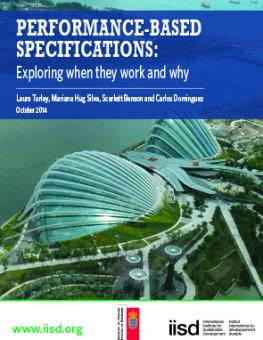
Performance-Based Specifications: Exploring when they work and why
This report seeks to contribute to the discussion on innovation and sustainable public procurement (SPP) through the investigation of the use of performance-based specifications (PBSs) in public procurement in the European Union and the United States.
The report examines the benefits and limitations of the use of PBSs at different points in the procurement cycle in different sectors, particularly around their ability to support sustainable development goals and deliver environmental benefits.
PBSs enable public procurers to specify a desired performance level or target to be achieved when they purchase goods, services and infrastructure, which provides a useful tool for the integration of environmental and social considerations into tenders and encouraging private sector innovation.
However, the use of PBSs can ultimately be burdensome for the public authority, as monitoring and verifying performance delivery once a tender has been awarded requires long-term commitment and management. As such, they simply shift the work of the procuring authority from the specifications/bid-writing stage into the evaluation and monitoring stage.
You might also be interested in
Green Public Procurement in India
This report analyzes the status of green public procurement (GPP) in India and suggests key strategies for advancing sustainable procurement practices.
The Role of Multilateral Development Banks for Low-Carbon Procurement in the Infrastructure Sector
This report examines the critical role of multilateral development banks (MDBs) in advancing low-carbon procurement within the infrastructure sector.
Green Public Procurement in Indonesia
This report explores the state of green public procurement (GPP) in Indonesia and offers key strategies for advancing sustainable procurement practices.
Monitoring Progress in Green Public Procurement
This report outlines the importance of monitoring progress in green public procurement (GPP) and highlights various methodologies, challenges, and recommendations.